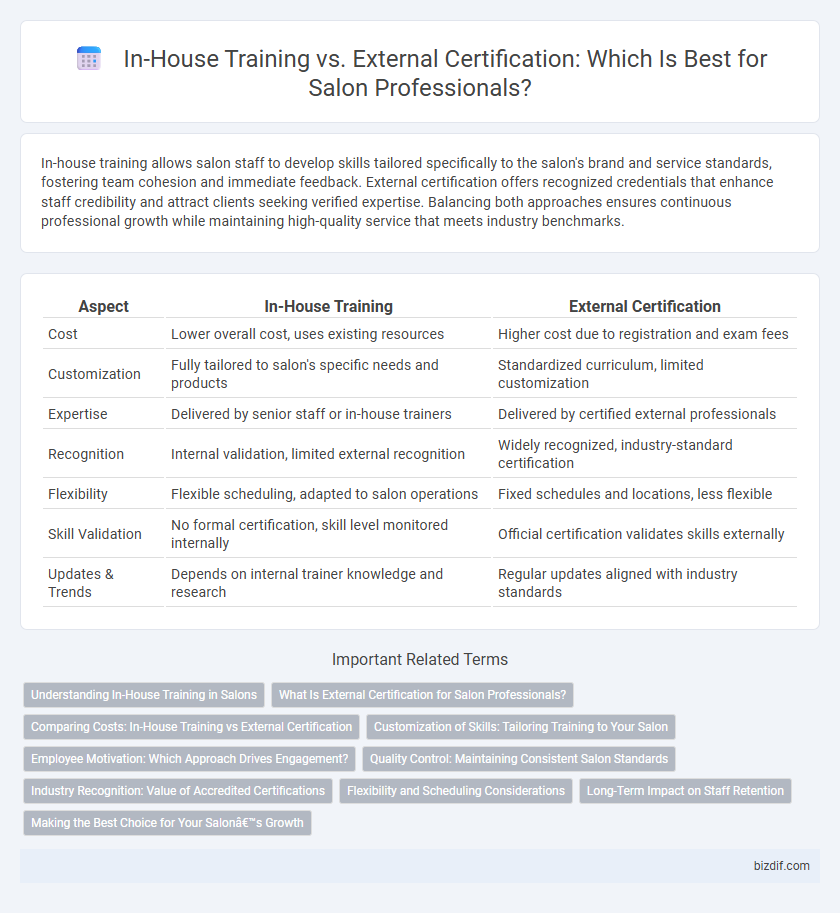In-house training allows salon staff to develop skills tailored specifically to the salon's brand and service standards, fostering team cohesion and immediate feedback. External certification offers recognized credentials that enhance staff credibility and attract clients seeking verified expertise. Balancing both approaches ensures continuous professional growth while maintaining high-quality service that meets industry benchmarks.
Table of Comparison
| Aspect | In-House Training | External Certification |
|---|---|---|
| Cost | Lower overall cost, uses existing resources | Higher cost due to registration and exam fees |
| Customization | Fully tailored to salon's specific needs and products | Standardized curriculum, limited customization |
| Expertise | Delivered by senior staff or in-house trainers | Delivered by certified external professionals |
| Recognition | Internal validation, limited external recognition | Widely recognized, industry-standard certification |
| Flexibility | Flexible scheduling, adapted to salon operations | Fixed schedules and locations, less flexible |
| Skill Validation | No formal certification, skill level monitored internally | Official certification validates skills externally |
| Updates & Trends | Depends on internal trainer knowledge and research | Regular updates aligned with industry standards |
Understanding In-House Training in Salons
In-house training in salons offers tailored educational programs designed specifically to meet the unique stylistic and service standards of the establishment, enhancing staff consistency and expertise. This approach allows for real-time skill development and immediate feedback, ensuring techniques and customer service align precisely with salon branding and client expectations. Investing in in-house training fosters a cohesive team environment and promotes continuous professional growth while maintaining the salon's competitive edge.
What Is External Certification for Salon Professionals?
External certification for salon professionals is a credential earned through accredited organizations that validate skills and knowledge beyond in-house training. These certifications often involve standardized exams, workshops, and continuous education to ensure industry compliance and competency. Recognized certifications boost credibility, enhance career opportunities, and demonstrate a commitment to professional growth in cosmetology and beauty services.
Comparing Costs: In-House Training vs External Certification
In-house training typically incurs lower direct costs by utilizing existing staff and resources, reducing expenses related to instructor fees and facility rentals. External certification often involves higher costs due to registration fees, travel expenses, and specialized training programs conducted by accredited organizations. Evaluating the balance between upfront investment and long-term benefits is essential for salons aiming to optimize employee skill development within their budget constraints.
Customization of Skills: Tailoring Training to Your Salon
In-house training allows salons to customize skill development specifically to their unique services, team dynamics, and client preferences, ensuring targeted improvement and consistency. External certification programs offer standardized curricula that may not align perfectly with salon-specific techniques or customer needs. Prioritizing in-house training facilitates adaptive learning, directly enhancing the boutique's signature style and operational efficiency.
Employee Motivation: Which Approach Drives Engagement?
In-house training in salons fosters personalized skill development and team cohesion, directly motivating employees through tailored learning experiences. External certification offers recognized credentials that enhance professional credibility and boost employee confidence, leading to increased engagement. Combining both approaches can create a comprehensive growth environment that maximizes motivation and retention within salon teams.
Quality Control: Maintaining Consistent Salon Standards
In-house training allows salons to tailor quality control measures to their specific service standards, ensuring consistent performance and client satisfaction. External certification provides standardized benchmarks recognized industry-wide, enhancing credibility and trust among clients. Combining both approaches optimizes skill development while maintaining uniform quality across all salon services.
Industry Recognition: Value of Accredited Certifications
Accredited certifications from external organizations hold significant industry recognition, enhancing a salon professional's credibility and employability. In-house training provides tailored skill development but may lack the formal validation that accredited certifications offer. Clients and employers often prioritize certified credentials as proof of standardized expertise and commitment to quality.
Flexibility and Scheduling Considerations
In-house training offers salons greater flexibility in scheduling, allowing sessions to be tailored around peak business hours and staff availability, minimizing disruption to daily operations. External certification programs often have fixed dates and locations, requiring salons to adapt their staffing and potentially incur additional costs for time off or travel. Prioritizing in-house training enables salons to align professional development with internal workflows, enhancing operational efficiency and staff retention.
Long-Term Impact on Staff Retention
In-house training fosters stronger team loyalty by creating personalized development paths that align with salon values, leading to higher staff retention rates. External certification offers recognized credentials that enhance professional credibility but may not directly influence attachment to the salon environment. Over time, salons investing in tailored in-house programs typically experience more sustainable employee commitment compared to relying solely on external certification.
Making the Best Choice for Your Salon’s Growth
In-house training allows salons to tailor skill development programs specifically to their brand's techniques and service standards, fostering consistent quality and team cohesion. External certification offers industry-recognized credentials that enhance staff credibility and attract clientele seeking certified professionals. Combining both approaches strategically can maximize technical expertise and market reputation, driving sustainable growth for your salon.
In-House Training vs External Certification Infographic

 bizdif.com
bizdif.com